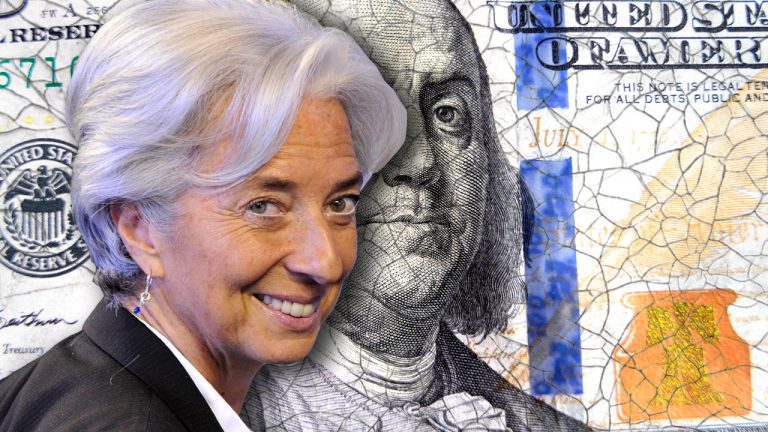
There is a lot of discussion lately about the U.S. government’s debt ceiling and whether Congress will act before defaulting. In a recent interview, Christine Lagarde, the president of the European Central Bank (ECB), said she is confident the U.S. can maintain its debt obligations. However, she warned that if the U.S. were to default on its debts, it would be a “major disaster.”
Lagarde Confident in U.S. Debt Management Despite Predictions of Possible Default Crisis for Government in August or September
Although the United States of America is an economic superpower, it has accumulated more than $31 trillion in debt held by the government and intragovernmental holding entities. The debt has grown exponentially over the last 20 years, and there has been much talk in recent times about the government defaulting on its interest and principal payments to foreign investors, foreign governments, and other entities. At the beginning of the year, the U.S. secretary of the Treasury, Janet Yellen, explained how the Treasury would need to enact “extraordinary measures” to pay its debts. However, she also warned that the funds would be “exhausted before early June.”
Unless Congress changes its approach, the U.S. government may be unable to pay interest and principal to specific lenders by summer. Yellen’s extraordinary measures provided the U.S. with roughly $800 billion, and the government anticipates a substantial amount of funding from taxpayers, which is expected to last until June. Speaking with the hosts of CBS News’ “Face the Nation” on Sunday, Christine Lagarde, the president of the ECB, discussed the debt issues in the United States and expressed her confidence in the U.S. managing its finances.
“I have enormous confidence in the United States,” Lagarde said. “I simply cannot believe that they would allow such a major, major disaster to occur with the United States defaulting on its debt. It is not possible. I cannot believe it would happen. If it did, it would have a very negative impact not only in this country, where confidence would be challenged, but also around the world,” Lagarde added. The ECB president continued:
Let’s face it, this is the largest economy. It’s a major leader in economic growth around the world. It cannot let that happen. I understand the politics, I’ve been in politics myself. But there is a time when the higher interest of the nation has to prevail.
Lagarde’s remarks on CBS followed commentary from economist Paul Krugman, who said there was a possibility of the U.S. defaulting on its debt. He stated that he did not know when it would happen, but it would likely occur because of a Republican-controlled House of Representatives refusing to raise the debt ceiling. “Who will trust the currency of a nation that appears to have politically lost its mind?” Krugman asked in his most recent opinion editorial. “If that happens, the threat to the dollar’s reserve-currency status will be the least of our problems.”
The ECB president raised the issue of the competition between the U.S. and China, which has been intensifying recently. Lagarde expressed her belief that healthy competition is beneficial and can bring about modernization. “There is undoubtedly a competition between these major economies,” Lagarde stated. “The U.S. is the first economy in the world. China is clearly competing and is putting all forces into that competition. I think competition is healthy. It has to stimulate innovation. It has to stimulate productivity. But it’s inevitable that these two large economies are facing each other.”
Despite Lagarde’s optimism, there has been a lot of tension between China and the U.S. recently. Tensions between the two countries heightened when Nancy Pelosi, the American representative from California, visited Taiwan in August 2022. The head of the European Central Bank emphasized that the competition “should not be confrontational,” and emphasized that “conflict is not inevitable.” While Lagarde is confident in the United States government’s ability to manage its fiscal responsibilities, Politico reporters Jennifer Scholtes, Paula Friedrich, and Beatrice Jin state that “by all indications, the U.S. is most likely to approach the brink of default in August or September.”
What are your thoughts on Christine Lagarde’s comments? Share your thoughts about this subject in the comments section below.






